Final Or Last Warning Letter To Employee
[Your Company's Letterhead]
[Date]
[Employee's Full Name]
[Employee's Job Title]
[Employee's Department]
[Employee's Address]
Dear [Employee's Name],
RE: Final Warning Letter
I hope this letter finds you well. We regret to inform you that, despite previous discussions and written warnings regarding your performance/behavior, there has been no significant improvement observed. As a result, we are left with no choice but to issue this final warning letter.
During your employment with [Company Name], we have made various efforts to support you in meeting the expected standards. We have discussed specific areas where improvement was needed, and you were provided with clear guidance and resources to help you achieve the desired level of performance/behavior.
However, our records indicate that the following issues persist:
[List specific performance/behavioral issues and instances where they occurred]
As an employee of our organization, it is essential that you adhere to our policies and fulfill your job responsibilities to the best of your abilities. Your actions not only impact your performance but also affect the overall productivity and morale of the team.
This final warning letter is a serious matter and signifies our last attempt to address the concerns. If there is no substantial improvement in your performance/behavior within [specific time period, e.g., 30 days] from the date of this letter, we will be forced to take more severe action, up to and including termination of your employment.
We encourage you to take this letter as an opportunity to reflect on your performance/behavior and to seek assistance if needed. If there are any factors affecting your performance, please bring them to our attention, so we can explore ways to support you better.
Furthermore, we strongly recommend that you schedule a meeting with your immediate supervisor or the Human Resources department to discuss a performance improvement plan and set clear, achievable goals moving forward.
Please be aware that any future infractions, if not addressed promptly, will be met with the appropriate actions outlined in our company policies and procedures.
We genuinely value your contributions to the company and hope to see you succeed in your role. However, the continuance of your employment is dependent on the improvements made during this probationary period.
If you have any questions or require further clarification, please do not hesitate to contact us.
Sincerely,
[Your Name]
[Your Job Title]
[Company Name]
[Contact Information]
Formal Final Warning Letter to Employee for Misconduct
Subject: Final Warning for Misconduct
Dear [Employee's Name],
This letter serves as your final warning regarding repeated misconduct in the workplace. Despite previous verbal and written warnings, we have observed that the issues persist. Specifically, your behavior on [specific date or event] violated company policies and disrupted the work environment.
As outlined in our employee handbook, such behavior is unacceptable. Please understand that any further instances of misconduct will result in immediate termination of your employment with [Company Name].
We urge you to take this matter seriously and make the necessary improvements. You are expected to comply with all workplace policies and maintain professional conduct at all times.
Sincerely,
[Manager's Name]
[Position]
Final Warning Email for Attendance Issues
Subject: Final Warning Regarding Attendance
Dear [Employee's Name],
This is to formally notify you that your attendance record remains unsatisfactory. You have been absent/late on several occasions without proper justification, even after prior warnings.
Consistent attendance is critical to maintaining productivity and teamwork. Please be advised that this is your final warning. Any further unexcused absences or tardiness will result in disciplinary action, which may include termination of your employment.
We encourage you to take corrective steps immediately. Should you need assistance with managing your schedule, kindly reach out to HR for support.
Sincerely,
[Manager's Name]
Last Warning Letter to Employee for Poor Performance
Subject: Final Warning – Unsatisfactory Job Performance
Dear [Employee's Name],
We have reviewed your performance over the past [time period], and unfortunately, it continues to fall below the required standards. Despite receiving feedback and support, there has been insufficient improvement in [specific performance areas].
This letter serves as your last warning. You are expected to make immediate and consistent improvements. Failure to meet the required performance standards will leave us with no choice but to consider termination.
We urge you to treat this warning with utmost seriousness and take necessary corrective actions.
Regards,
[Supervisor's Name]
Final Warning Letter for Violation of Company Policy
Subject: Final Warning for Policy Violation
Dear [Employee's Name],
It has been brought to our attention that you violated company policy on [specific policy] on [date]. You were previously warned about similar behavior, yet the violation has recurred.
Please understand that this is your final warning. Any future violation of company policies will result in termination of your employment. We expect you to strictly adhere to all organizational rules and regulations.
Sincerely,
[HR Manager’s Name]
[Company Name]
Serious Final Warning Letter for Workplace Harassment
Subject: Final Warning for Harassment
Dear [Employee's Name],
We are writing to address serious concerns regarding your conduct in the workplace. Following an investigation, it has been confirmed that you engaged in inappropriate behavior that constitutes harassment. This behavior is unacceptable and will not be tolerated.
Please be advised that this is your final warning. Any further incidents of misconduct will result in immediate dismissal from [Company Name].
We expect you to maintain professionalism and respect toward all colleagues. Failure to comply will have severe consequences.
Sincerely,
[Manager's Name]
[Position]
Final Warning Email for Insubordination
Subject: Final Warning for Insubordination
Dear [Employee's Name],
It has been observed that you repeatedly refused to follow reasonable instructions from your supervisor on [specific dates/incidents]. Such insubordination undermines authority and disrupts team efficiency.
This email serves as your final warning. Any further refusal to comply with instructions will result in termination of your employment. You are expected to respect managerial authority and work within company guidelines.
We trust you will take this matter seriously and demonstrate immediate improvement.
Sincerely,
[Manager’s Name]
Final Warning Letter for Safety Violations
Subject: Final Warning for Safety Violation
Dear [Employee's Name],
Your repeated failure to follow workplace safety guidelines has been noted, despite prior reminders and warnings. Such negligence poses a risk to both yourself and your colleagues.
This letter is your final warning. Any future violation of safety rules will result in termination. We urge you to prioritize safety and strictly follow all established procedures.
Failure to comply will not be tolerated.
Sincerely,
[Safety Officer/Manager’s Name]
What is a Final or Last Warning Letter to Employee and Why Do You Need It
A final or last warning letter is a formal document issued by an employer to an employee when prior warnings have not resolved an issue.
It serves as the final notice before termination and gives the employee one last chance to correct their behavior, performance, or compliance with policies.
Employers need it to document disciplinary steps, maintain fairness, and protect the organization legally.
Who Should Send the Final Warning Letter
- Direct manager or supervisor responsible for the employee.
- HR manager overseeing employee conduct and compliance.
- In some cases, higher-level management or directors when issues are severe.
To Whom Should a Final Warning Letter Be Addressed
- The employee whose conduct, performance, or attendance is in question.
- A copy may be sent to HR for documentation.
- In serious cases, a copy may also be kept in the employee’s permanent record.
Common Situations When This Letter Is Required
- Persistent misconduct despite previous warnings.
- Chronic absenteeism or tardiness.
- Failure to improve job performance after support.
- Policy violations such as misuse of company property.
- Safety violations putting others at risk.
- Harassment or inappropriate workplace behavior.
Formatting Guidelines for a Final Warning Letter
- Keep the tone firm, professional, and clear.
- State the issue and reference previous warnings.
- Explain the consequences of further violations.
- Include expectations for corrective action.
- Use official letter format or email depending on seriousness.
Requirements Before Writing a Final Warning Letter
- Documentation of previous warnings.
- Clear evidence of misconduct or performance issues.
- Reference to company policies and handbook.
- Consultation with HR to ensure compliance with labor laws.
- Approval from management before issuing.
What to Do After Sending a Final Warning Letter
- Monitor the employee’s performance and behavior closely.
- Provide support or training if appropriate.
- Keep a record of the employee’s response.
- If no improvement is observed, proceed with termination procedures.
Common Mistakes to Avoid When Issuing a Final Warning Letter
- Using emotional or unprofessional language.
- Failing to provide evidence of the issue.
- Not referencing prior warnings.
- Leaving the consequences unclear.
- Sending the letter without HR review.
Elements That Must Be Included in a Final Warning Letter
- Subject line and date.
- Description of the issue and dates of incidents.
- Reference to prior warnings or actions taken.
- Statement that this is the final warning.
- Clear outline of expected changes.
- Consequences of further non-compliance.
- Closing with authority and signature.
Tricks and Best Practices for Writing Effective Warning Letters
- Keep it factual, not personal.
- Avoid vague statements; be specific.
- Maintain a balance of firmness and fairness.
- Allow room for improvement by setting expectations.
- Always keep a copy for organizational records.
Pros and Cons of Using a Final Warning Letter
Pros:
- Provides a structured and fair process.
- Gives the employee a last chance to improve.
- Protects the employer in case of legal disputes.
Cons:
- May demotivate or upset the employee.
- If not followed up properly, it loses its effectiveness.

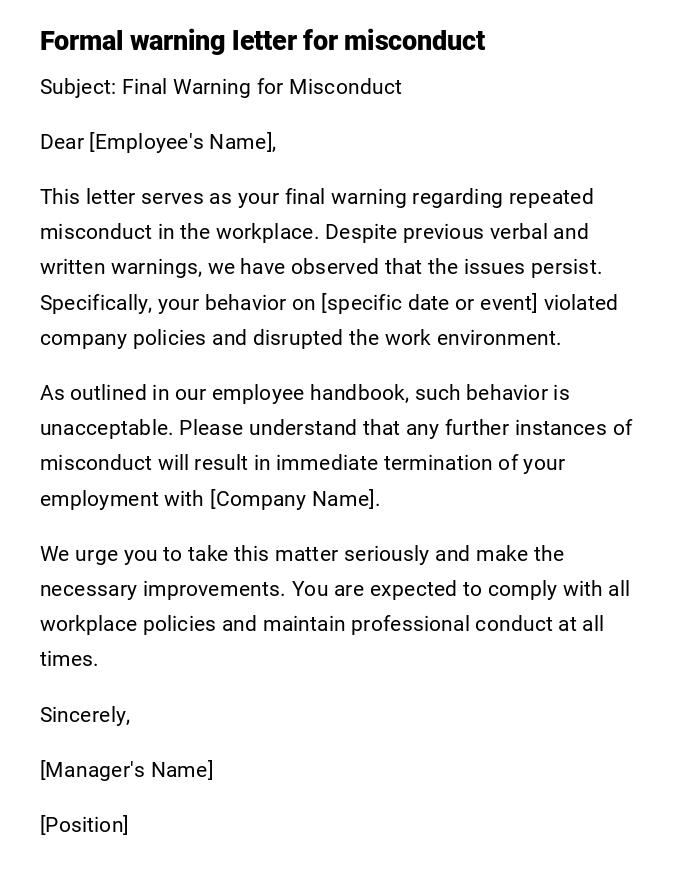
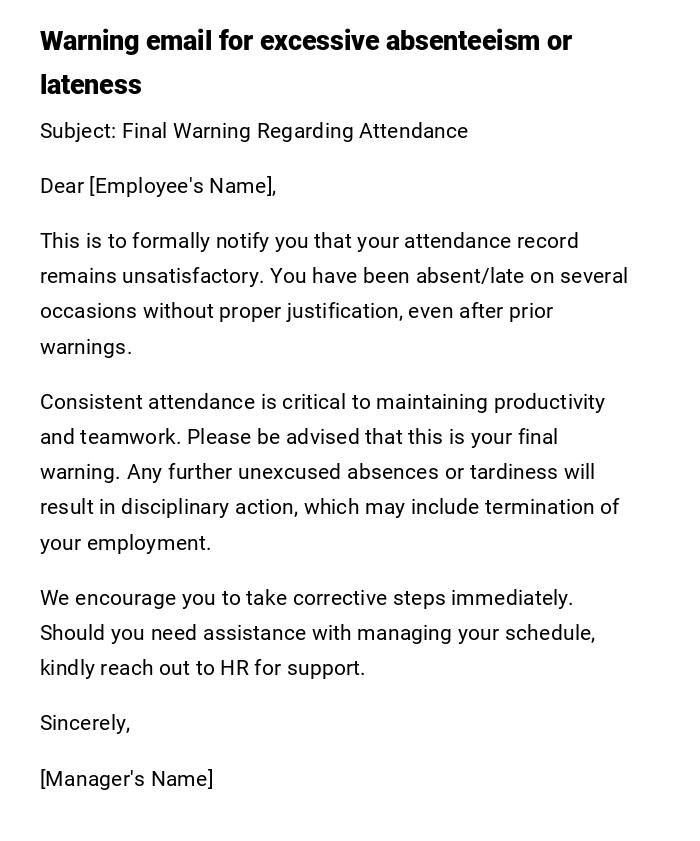
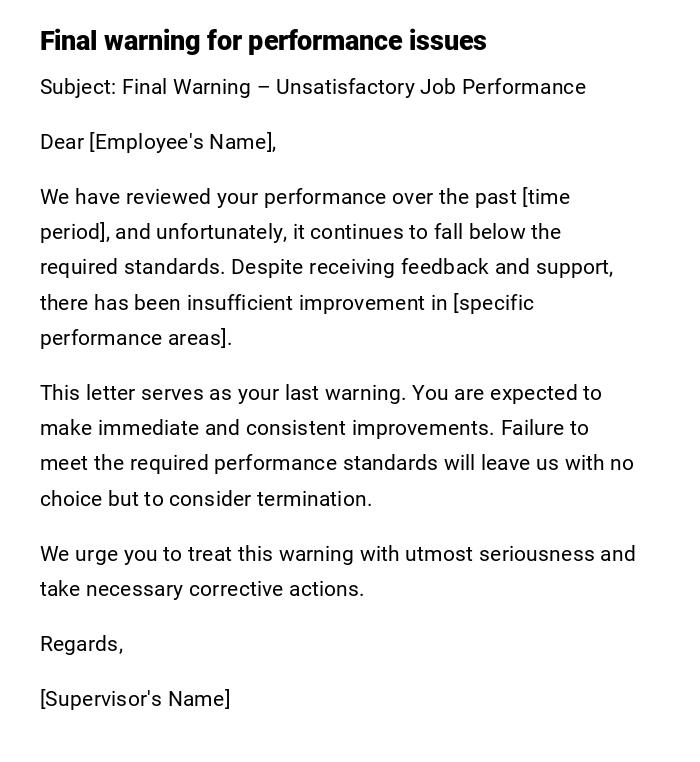
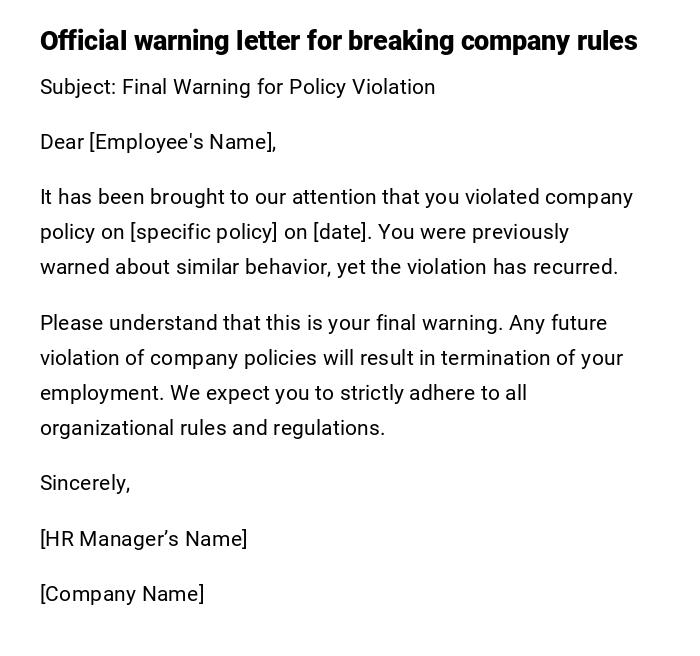
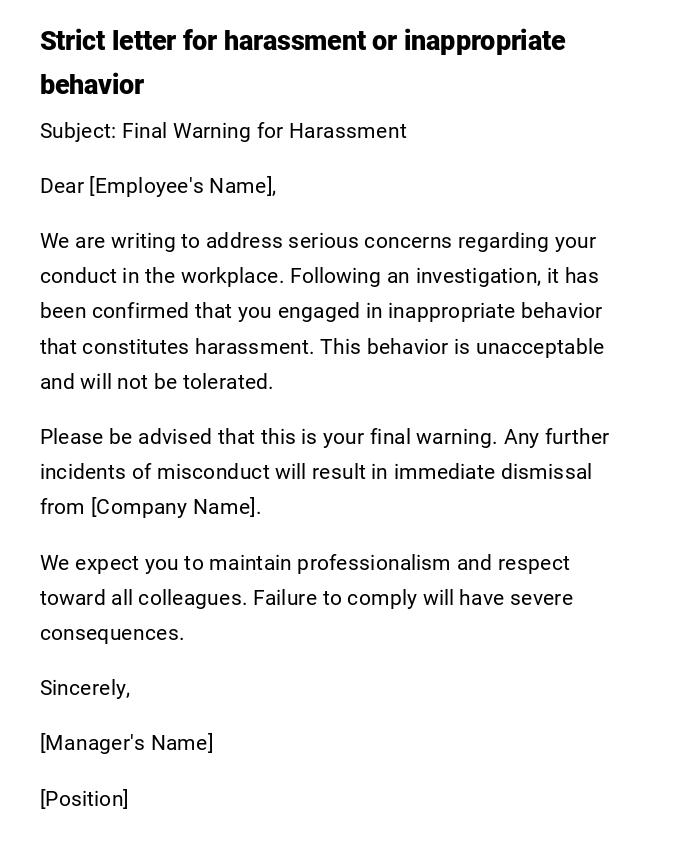
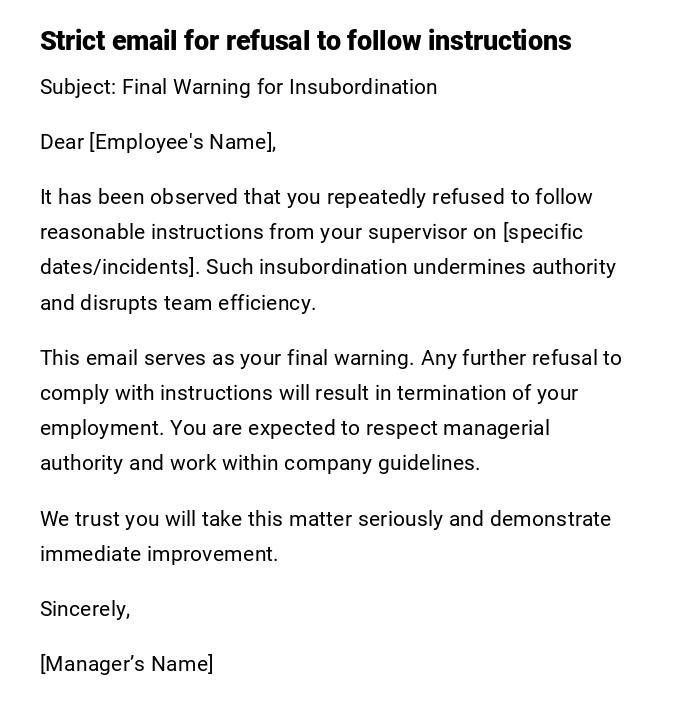
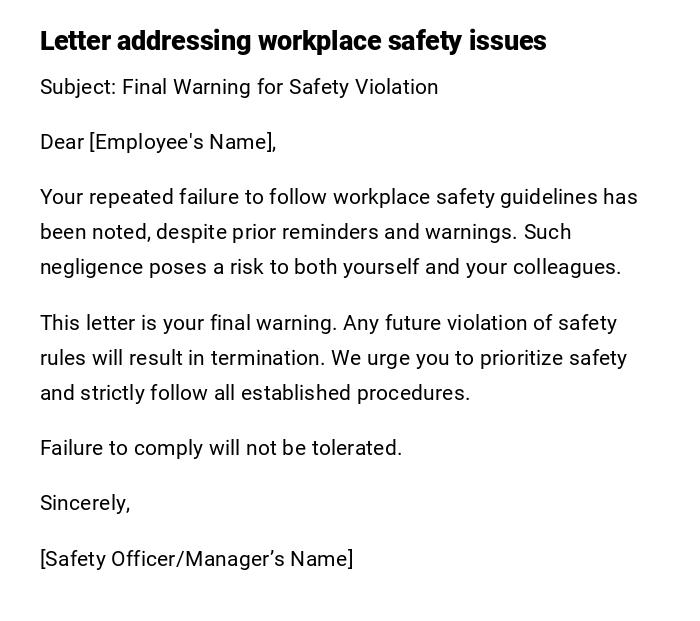

 Download Word Doc
Download Word Doc
 Download PDF
Download PDF